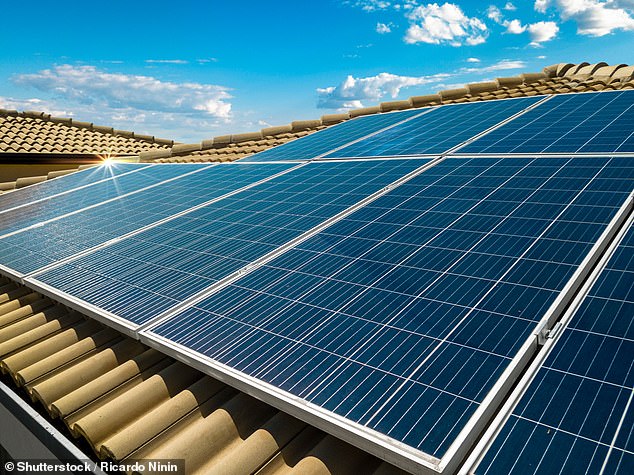- Solar panel installations rose by almost 50% last year, new figures show
- High energy bills are behind the rise – but panels still have their naysayers
The rate of new solar panel installations on homes reached a seven-year high in 2023, according to new analysis.
More than 161,494 new solar panels were installed on homes last year, which is a 44.6 per cent increase on the 111,713 new installations in 2022.
The increase was revealed by Coventry Building Society analysis of government solar panel figures.
The rate of new solar panel installations is now at the highest level since 2015, when the total for the year was 179,137.

Soak up the sun: More Britons are choosing solar panels, but the devices still have their naysayers who say they are not worth the outlay
But much of the 2015 spike was driven by government subsidies for solar panel installations, which were cut down in 2016.
The 2023 boom in solar panel fitting was likely caused by households looking to bring down high energy bills.
The average home is currently paying gas and electricity bills of £1,928 a year, limited by the Ofgem price cap.
The highest year on record for solar panel installations was 2011, when 200,589 panels were installed – this was following the launch of the Feed-in Tariff scheme in 2010.
This paid solar panel owners for any electricity they did not use, which could be effectively sold back to the National Grid.
However, the scheme closed to new customers from 1 April 2019.
The main current government perk for homes fitting solar panels is 0 per cent VAT on energy-saving materials added to a property. This is due to end on 1 April 2027.
The total number of solar panels on UK homes now stands at 1.2 million, a 14.4 per cent increase from the end of 2022.
Sophie Mason from Coventry BS said: ‘The soaring cost of energy has led more people to invest in renewable energy sources for their home.
‘When you factor in the additional benefits of reducing your carbon footprint, and potentially adding value to your home with an improved EPC rating, it’s little surprise to see the surge in popularity of solar panels over the last two years.’
Are solar panels worth it?
Solar panels are usually a good investment if you plan to stay in your home for at least ten years after you install them.
This is because it generally takes that long to recoup the initial cost of getting the panels fitted from years of lower electricity bills.
Fitting typically costs around £5,500, or twice that with a storage battery that allows you to keep surplus energy to use when you like, not just when it is light outside.
However, you may not make the money you spend on solar panels back if you sell your house sooner.
Some buyers may see solar panels as a valuable asset and be willing to pay more for a home with them fitted.

Smart move? It generally takes ten years to recoup the initial cost of getting the panels fitted from years of lower electricity bills
Renewable energy firm iChoosr said solar panels can add up to £2,722 to the value of a home.
But others will not recognise their value, and may even pay less for a home with solar panels if they think they are unsightly.
However, there is an environmental benefit to having solar panels installed too, as well as security that you can still have electricity in the event of a wider power cut.
George Frost, UK country manager at iChoosr, said: ‘The spike in solar panel adoption in 2023 was driven, in part, by the cost of living crisis and rising energy bills. But there has also been a significant mindset shift on installing renewable energy sources by UK homeowners and home-seekers.
‘There is now a near-on consensus across the UK that we are knee-deep in a climate emergency, demonstrating the urgent need for the transition towards renewable energy.’



